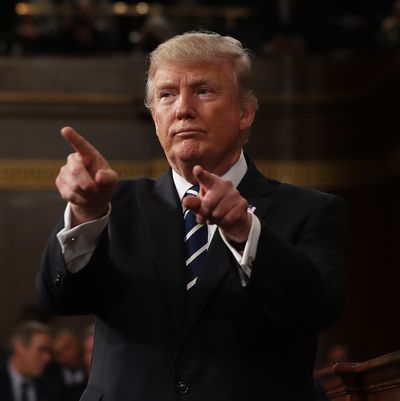
Having President Trump pressure wavering Republicans is a key part of the GOP leadership’s strategy for passing the American Health Care Act, but so far the president has been uncharacteristically reserved. His public commentary mainly consisted of claiming, falsely, that “everybody” likes the bill, and making one mild jab at Rand Paul on Twitter.
Trump has been meeting with critics of the bill at the White House, but his commitment to passing the AHCA in its current form is unclear – perhaps intentionally. “He has leaned all the way in and has had a deft touch,” White House counselor Kellyanne Conway told the Washington Post. “We’ve had an open-arms, olive-branch, politely-nod-your-head mentality.”
Some details about Trump’s stance on specific provisions emerged on Wednesday during an Oval Office meeting with representative from anti-AHCA Republican groups, including the Heritage Foundation, Club for Growth, Tea Party Patriots, and Americans for Prosperity. Trump and other White House officials defended the tax credits that allow lower-income Americans to buy insurance, though some conservatives say that creates a new entitlement. “There was no budging on tax credits,” one official in the meeting told Politico. “That remains the biggest sticking point.”
But the White House isn’t completely opposed to making the AHCA even worse for poor people. When the conservative groups brought up rolling back Obamacare’s Medicaid expansion next year rather than holding off until 2020, Trump aides said they were “open to discussing it,” according to CNN. The Post reported that the White House also seemed open to allowing insurance companies to offer less robust health plans in 2018, rather than waiting to 2020.
Trump seemed confident that the bill would pass in the House, though the changes that would make the AHCA acceptable to extreme conservatives would make it toxic to moderate Republicans. As Politico notes, backing the AHCA may be the riskiest for the roughly two dozen Republicans from swing districts where Trump isn’t very popular.
Trump’s tweets might not have much power over those Republicans, but he’s more focused on winning the Senate anyway. He told the conservative groups that he intends to target Democratic senators from red states who are up for reelection next year. “Trump said he will have football stadium events in states where he won by 10-12 points and he is going to dare people to vote against him,” said a source who was at the meeting.
A White House official said Trump made it clear that “this is the chance to repeal and replace,” but Politico and CNN reported that he also brought up his fallback plan: Let Obamacare fail on its own, blame the Democrats, and push another Republican health-care plan two years from now.
This is one of Trump’s most consistent arguments about health-care reform. In remarks earlier this year at the Republican retreat CPAC, and on Twitter, Trump mentioned that the smartest political move would be to do nothing to improve the health-care system.
“I actually talked with Paul [Ryan] and the group about just doing nothing for two years, and the Dems would come begging to do something because ’17 is going to be catastrophic price increases, your deductibles are through the roof, you can’t use them, and they will come to us,” Trump said at the annual GOP retreat in Philadelphia.
However, Trump concluded that it’s too cruel to let millions of Americans suffer just to score some political points. “I’m serious if we waited two years it’s going to explode like you’ve never seen an explosion,” he said. “That’s politically what we should do but we don’t want to do that.”
So Trump is betting that after promising to repeal and replace Obamacare immediately, backing a bill everyone hates, failing to make members of his own party pass it, then doing nothing for two years as Americans go broke and even die, the country is going to blame Democrats for failing to fix the health-care system.
Those football stadium rallies better be spectacular.






























